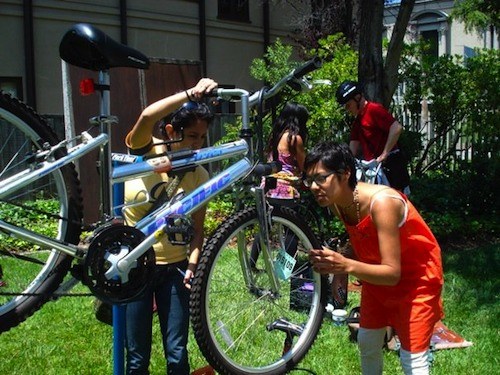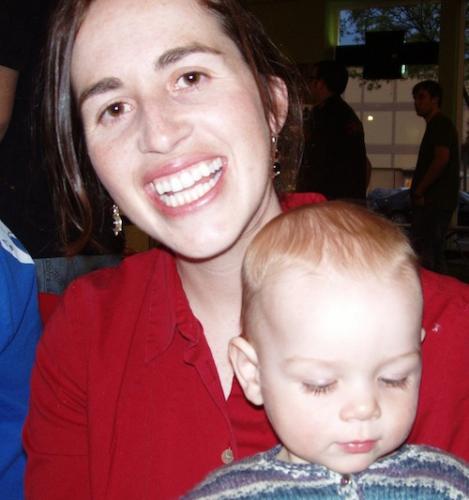Over a hundred years ago, H.G. Wells famously quipped, “When I see an adult on a bicycle, I do not despair for the future of the human race.”
When Wells wrote his novel Cycles of Change in 1896, the world was in the throes of a bicycling craze. James Kemp Starley’s 1885 invention of the modern bicycle enabled the working classes to travel quickly and cheaply for the first time. Women who had been constricted in corsets, hoops, and petticoats were donning bloomers and discovering a newfound freedom of movement.
Today in the United States it can be harder to muster Wells’ optimism about the bicycle. Only one percent of urban trips in this country are made by bike, and only 0.55 percent of people commute to work on a bicycle.
And although Susan B. Anthony once credited the bicycle with doing “more to emancipate women than anything else in the world,” today the vast majority of American cyclists are white males. According to research by John Pucher, American men make three times more trips by bicycle than women. Plus, a 2008 NSGA Sports Performance Study found that while African Americans and Hispanics make up 12 and 15 percent of the U.S. population respectively, each group represents only about six percent of bicyclists.
Obviously there are some huge barriers to bicycling in the United States, especially for women and minorities.
Nevertheless I discovered ample reason for optimism about the future of American bicycling. In cities across the country, people are coming together to form bicycle cooperatives with the mission to make buying, building, and repairing bikes an affordable, accessible, and shareable experience. And many of them are reaching out to women and minorities.
Bicycle cooperatives are independent, and the services they offer vary from place to place. But most teach affordable classes in bike repair; provide stands and tools that people can rent by the hour; and have experienced bike mechanics on hand to answer questions. Some of them also offer earn-a-bike programs that allow people to exchange labor for used bicycles.
I spent some time learning about three cooperatives: The Center for Appropriate Transport in Eugene, Oregon; ColectiVelo in East Oakland, California; and Broadway Bicycle School in Cambridge, Massachusetts.
All CAT photos by Abby Quillen
The Center for Appropriate Transport – Eugene, Oregon
Jan VanderTuin visited a number of organic farms in Europe in the early 1980s and was inspired by the producer consumer relationship at a farm in Geneva, Switzerland. So when he returned to the U.S., he and a few other farmers started the CSA Gardens at Great Barrington in Massachusetts in 1985 and introduced the Community Supported Agriculture movement to the United States.
After that VanderTuin moved to Eugene, Oregon and turned his innovative eye to the world of bicycling. He opened the Center for Appropriate Transport (CAT) in 1992 in a sprawling 8,000 square foot building in the center of town.
CAT encompasses Eugene Bicycle Works, a bike-repair cooperative; Human Powered Machines, a company that manufactures recumbent cargo bikes; Eugene Rack Works, which makes and sells bicycle racks; and Pedalers Express, a bicycle courier and valet service.
It’s also a private alternative school registered with the Oregon Department of Education, which means CAT receives public funds to educate middle and high school students in subjects like metalworking, bike repair, computer-aided mechanical design, and industrial sewing.
“A lot of people come in and say, ‘Hey can you fix this?’ We suggest that they fix it themselves, and they get really into it,” Natalie Dreyer tells me as we wander around the center on a drizzly weekday afternoon. She’s CAT’s full-time seamstress; she sews rain ponchos, pants, and booties, which are for sale.
As we talk, banging and welding noises echo in from the back part of the warehouse, where VanderTuin is building cargo bicycle frames with CAT’s three apprentices.
Dreyer points out a BMX bike on the sales floor. “That’s one of the student projects,” she says. “They do frame building. And they do some kind of crazy stuff. They have a lot of fun with it.”
The banging competes with Indy-rock music, which is blaring from speakers in the front part of the building, where the bike-repair cooperative is located. There, four bike stands sit vacant, ready for customers to use to build and fix their own bikes.
Membership costs $50 a year, which buys a person unlimited access to the stands and a large assortment of tools. Or customers can drop in and pay $8 an hour. “There are usually two or three people working out here,” Dreyer says. “Nicer days are busier.” CAT also holds popular bike-repair classes on Saturdays.
In a small room adjacent to the bike-repair area, tubs overflow with used bike parts and components. And up a narrow staircase, used frames hang from the ceiling in a dim attic space. Dreyer estimates that a customer could purchase a membership to CAT and all of the parts to build a bicycle for as little as $100.
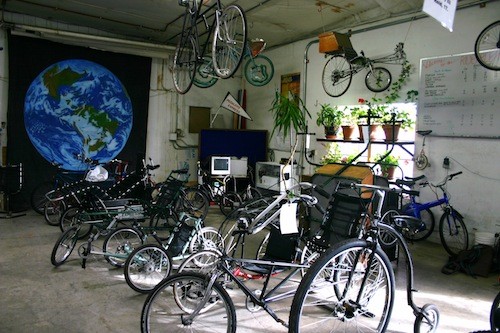
A trained mechanic is always on hand to help customers with bike repair; today he’s repairing one of the cargo bikes CAT uses for Pedalers Express deliveries. A few customers wander in and out. One of them heads to CAT’s small library, which is furnished with a couch and shelves of books and magazines about bikes. Until last June CAT published the now-defunct Oregon Cycling Magazine.
Dreyer points out some exotic-looking bicycles hanging from the ceiling. “Jan, our director, has worked with bikes for a really long time. He helped design a lot of the first recumbent designs and the first cargo designs. That’s what you see up here.”
VanderTuin launched CAT’s apprenticeship program last February in the hopes that regional bike centers like CAT will open across the country.
“One of our apprentices started a bike co-op in Fargo,” Dreyer says. “He’s out here learning the bike-building side of it so he can take that back to Fargo. Our apprentices are becoming part of a human-powered network.”
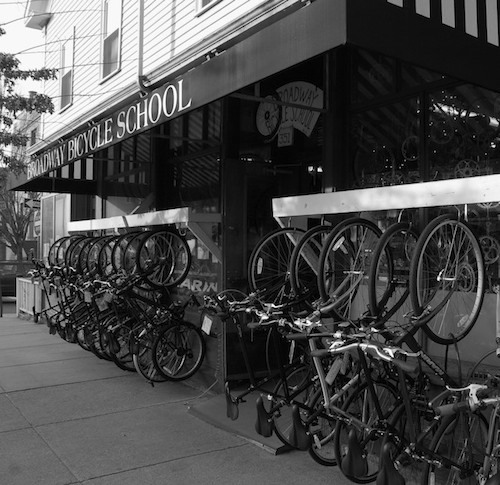 Courtesy of Broadway Bicycle School
Courtesy of Broadway Bicycle School
Broadway Bicycle School – Cambridge, Massachusetts
Broadway Bicycle School, a worker-owned and operated bike shop in Cambridge, Massachusetts, draws a distinctly elite clientele. “A lot of our customers are students at MIT and Harvard,” Suzanne Hunt says.
Hunt, who has worked at Broadway Bicycle School for 15 years, currently shares ownership of the shop with six other collective members.
Hunt says it can be challenging to work at a collective, but she loves it. “You can run a small business without having it be your entire life. You talk to a lot of small business owners and it’s pretty much all they do,” she says. “Decision making is a lot harder. But it’s very rewarding.”
Like most bike shops, Broadway Bicycle School sells new and used bikes and parts, and their trained mechanics repair customers’ bicycles. In addition, Broadway rents stands and tools to people who want to do repairs themselves for $15 an hour, plus an additional fee for mechanical assistance. “At any given moment, there will be one or two people working alongside us,” Hunt says.

Hunt says the shop has a different atmosphere from many bike shops. “In a lot of shops, you go in and there are just people selling stuff to you, and everything’s neat and clean. In our shop there are tools everywhere. The shop is pretty small, and customers come in and see us working on bikes right there,” Hunt says. “It’s a pretty busy, hectic environment, but a lot of fun.”
Broadway offers four different bicycle maintenance classes in the evenings. Hunt says that although it might seem like teaching people to fix their own bikes would hurt Broadway’s business, it hasn’t turned out that way.
“What most people decide to do is not fix everything on their bike. But they’re more educated. They know when their hub is loose or they know when they need an adjustment, and they’ll bring it in.”

Broadway designates one of its classes for women and transgender individuals. “The idea is to give women, who may have not grown up with tools in their hands in the way that some men have, the opportunity to feel comfortable making mistakes,” Hunt explains. Broadway began advertising the class to transgender individuals about six months ago, after a collective member traveled to the West Coast and visited a bike collective offering a similar class.
Broadway’s collective members are aware that many bike shops are primarily staffed by male mechanics, which can make them intimidating places for women. For over twenty years, they designated Fridays as women’s-only day, when just women staffed the shop.
Many of those women were apprentices or seasonal workers. “It can be up to 12 or 13 employees who unfortunately have to get laid off in October or November, because business drops off so much,” Hunt says. This winter only one non-collective-member works there; four more are ready to start when the weather warms up.

But Broadway has tried to use the seasonal lulls to recruit female mechanics. Fifteen years ago, Olli Doo (who happens to be the wife of Shareable.net's editor) was recruited to the Broadway collective in an apprenticeship program targeted at women. She trained as a mechanic through the slow, cold months, and was able to progress through seasonal worker to full collective member.
"The commitment to employing equal numbers of men and women unfortunately continued to mean that, come hiring time, we'd have a group of experienced men and a group of inexperienced women, which could be a huge drain on the time and other resources of a small shop like Broadway," she says. "But the collective used the winter surfeit of time and space and human power to invest in developing the skills of women, which over time strengthened the collective."
Broadway can't always maintain a fifty-fifty split between men and women. A few years ago, says Hunt, three female mechanics left Broadway at once, and currently only two of the seven collective members are female. So they had to temporarily discontinue women’s-only Fridays. But Hunt says, “We want to get back to that. It’s something I’m really conscious of getting back to.”
 Courtesy of ColectiVelo
Courtesy of ColectiVelo
ColectiVelo – East Oakland, California
Although Bostonians must cope with months and months of snow and ice, and Eugene bicyclists have to contend with 141 days of rain a year, riders in East Oakland, California unquestionably face some formidable challenges.
“There are enormous potholes and some things I’ve never seen before on a street like huge mounds of asphalt, like a foot or two high. It’s kind of intense for your typical road bikes,” Morgan Kanninen says.
Last January Kanninen founded ColectiVelo (formerly Centro Commutario de Bicicletas), a bicycle repair cooperative housed in the back of the Oakland Catholic Worker. ColectiVelo is targeting the Latino day-laborer population of East Oakland, hoping to get bicycles to the people they think could use them the most.
“The city of Oakland designated day-labor hiring zones,” Kanninen says. “So it’s a hub for day laborers to live in. The Catholic Worker has been established here for 20 to 30 years to serve folks with the least in terms of opportunities, and day laborers are often those people.”
 Credit: Russell Mondy
Credit: Russell Mondy
Kanninen spearheaded the collective after visiting some cousins in Mexico City and teaching bike repair on the streets there. “I had tools down there and thought I would just teach people as a way to get to know locals, and I really loved it. When I came back I was really excited to keep doing that.”
ColectiVelo is a young collective, but it has four devoted members and a large variety of tools and bike parts. Right now it’s open every Saturday for four hours. “I’m really encouraged that we’ve had sometimes four or five people at the shop either participating in a little bike class I’m hosting out on the sidewalk or fixing up their own bike or just kind of hanging out,” Kanninen says.
The cooperative works on a no-cash model. Customers can earn a bike by providing something in return. “That could be cleaning up and sorting parts, or honestly whatever they think. Folks are asked to have their own initiative about what they think the bike shop needs,” Kanninen says. “We’ve never set a time limit or a rate, and we’ve pretty much accepted everything that’s been offered.”
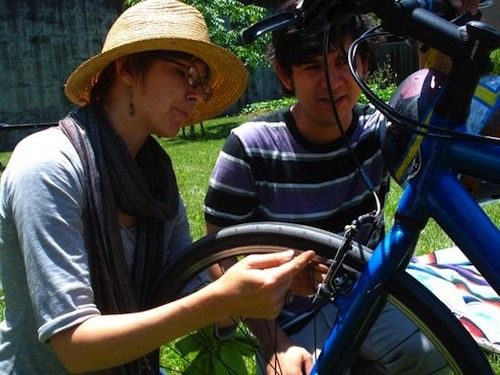
Kanninen envisioned the shop not only as a bike-repair cooperative, but also as an “Intercambio” where English and Spanish speakers can commingle and teach each other language. She’s glad to see that’s becoming a reality.
“We’re trying to be a Spanish predominant environment,” she says. However, two of the collective members don’t speak Spanish perfectly, and Kanninen says that has actually been a plus. People come in and see that “these folks who are more powerful and privileged in society are also having to struggle and fumble and appreciate that process as learners. I think that’s really powerful.”
Kanninen has big plans for the future. She wants to work with the Brown Berets to do outreach in the community, bring tools to day-laborer hiring zones to do on-site skill-shares, and get more folks from the day-laborer community to join the collective.
But for now she’s encouraged to see people coming in, using the shop, and just commingling. “I’ve seen people really enjoy being at the collective and come back with their kids and seem really glad that we exist and that we’re in their neighborhood,” she says.
She sees the “the individualist notion of how to make change happen in one’s life” as one of the barriers to creating safe routes for bicycling in the U.S, and she hopes ColectiVelo and other collectives will help to change it.
“One of the hopes I have for this project is that people in growing their community and realizing their common cycling desires will want to become more of an influence on community planning and infrastructure in the area,” Kanninen says.

